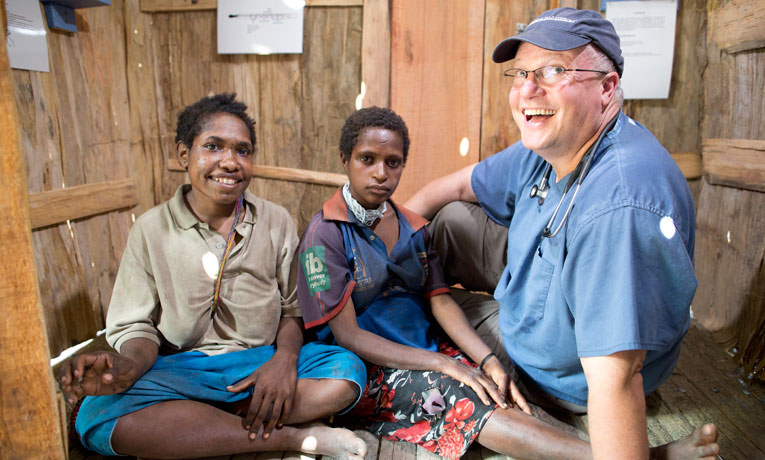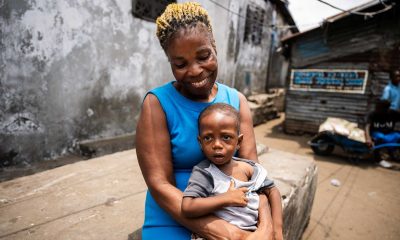By Dr. Allan T. Sawyer, an OB/GYN who is serving with World Medical Mission in Papua New Guinea
We recently went to the village of Yifififiki to teach childbirth classes. Shortly before our arrival, the Hewa men build an open-air classroom with a one-room medical clinic and storeroom on the backside. The dark blue tarp on the opposite side was donated by Samaritan’s Purse, and these tarps provided our students with shade and protection from the rain.

The curriculum of the Community Based Health Care and the Village Childbirth Attendant course normally takes months to get through, so we had to pick and choose our topic carefully to cover the highlights and the most important items during our five teaching days.
Our students were from at least five tribes from the surrounding region. On one side of the classroom we had most of the women and children. On the opposite side were the men and young boys. Even the dogs, chickens, rooster, and a young cassowary would come in and listen briefly to our teaching.
The first few days were taught by Matthew Galman, a PNG national. Last August Matthew was in a head-on collision with a truck. He sustained a right-sided pelvic fracture, and the rescue team had to break his left leg to free it from the wreckage.
When I spoke to people about Matthew they said, “Before the accident, Matthew was a good man. After the accident, Matthew has become a great man.”

As I got to know Matthew I appreciated how true this was. He has a genuine love for people and an amazing gift at being able to teach and to communicate. He speaks English beautifully, but also speaks Melanesian Pidgin as well as half a dozen local languages.
Matthew spent the first few days covering mostly personal hygiene issues. We had brought 150 toothbrushes and 150 tubes of toothpaste, and Matthew explained to his students how to brush their teeth. These people had never even had a toothbrush before.
Dr. Stephanie Doenges and Dr. Becky Morsch spent an entire day on normal childbirth. The following day I taught on complications of childbirth, including postpartum hemorrhage, fetal malpresentations, postpartum fever, and management of delivery of the placenta.

When I taught I used Matthew to translate to Pidgin and then a man named Faimpat would translate into Hewan. Faimpat became one of the key men among the Hewa. I liked him immediately.
On the second day that we were there, Faimpat cut the bottom of his foot while playing soccer on the mud court. He had a laceration between his first and second toe on his left foot. I washed his foot and applied antibiotic ointment daily, and on the second day I placed a single suture so that the laceration would stay together. He really needed a pair of shoes, so I removed my sandals and put them on his feet. He was so happy. I think they might have been the first pair of shoes that he has ever had.
When we finished our very condensed five-day course the people were extremely grateful. They told us that they never had heard nor been taught so many of these things.
The men in particular were thankful for having been taught about childbirth, and about how they could help the women in their tribe when giving birth. They explained that no doctors had ever come to help them before.
To express their gratitude, the various tribes pulled together on the last day and cooked four enormous pigs and served a feast for everyone who had come to the training. They gave us spears and the women gave our ladies hand woven bilums (large open bags or purses) that they had woven from tree bark. Their gratitude was genuine and sweet.






